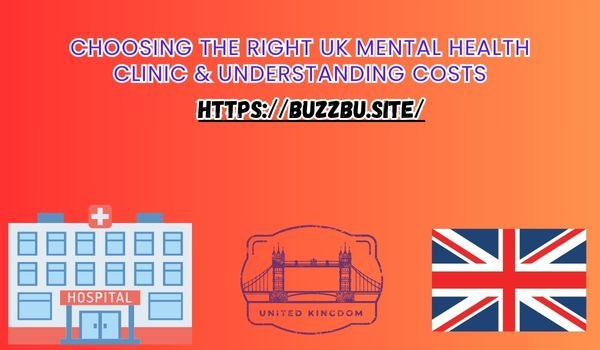In the UK, navigating mental health support can feel like wandering through a maze, especially when finances are tight. But please know this: Your mental well-being is priceless, and finding effective, affordable care is possible.

This guide cuts through the confusion, helping you understand your options and make informed choices about UK mental health clinics in 2025, without feeling lost or overwhelmed by the price tag.
Why Finding the Right Clinic Matters (It’s Not Just About Price)
Choosing a mental health clinic isn’t like picking a gym membership. It’s deeply personal. The right fit means finding therapists who truly understand you, a treatment approach that resonates, and an environment where you feel safe and respected. A cheaper option that doesn’t meet your needs is ultimately more costly – in time, emotional energy, and delayed healing. Think of it as an investment in reclaiming your life.
Your UK Mental Health Support Map: Understanding the Landscape
Before diving into costs, let’s map out the main pathways:
The NHS (National Health Service): Your first port of call. Through your GP, you can access:
IAPT (Improving Access to Psychological Therapies): Free, evidence-based talking therapies (like CBT) for common conditions (anxiety, depression). Waiting times vary (weeks to months), and session numbers might be limited.
Secondary Mental Health Services: For more complex or severe needs (severe depression, bipolar, psychosis, complex trauma). Referral is via your GP. Waiting times for assessment and treatment can be significant (months), but care is free at the point of use.
NHS Talking Therapies: Similar to IAPT, often delivered by different NHS trusts. Check what’s available locally.
Private Mental Health Clinics: This is where choice and speed often increase, alongside cost. Private clinics offer:
Faster Access: Appointments often available within days or weeks.
Greater Choice: Specific therapists, therapeutic approaches (CBT, DBT, EMDR, Psychodynamic, Integrative), and specialists (trauma, eating disorders, OCD, ADHD assessment).
Flexibility: More session times, potentially longer or more frequent sessions.
Specialised Programs: Intensive outpatient programs (IOPs), day programmes, or sometimes residential care.
Charities and Non-Profits: Organisations like Mind, Anxiety UK, Rethink Mental Illness, and many local charities offer invaluable support: lower-cost counselling, support groups, helplines, and resources. Often staffed by trained volunteers or qualified therapists offering reduced rates.
Demystifying the Costs- What You Might Pay Privately (2025 Guide)
Private therapy costs vary widely across the UK (London is typically most expensive). Here’s a realistic breakdown:
- Initial Assessment/Consultation: Usually 60-90 minutes. Expect £150 – £300. This is where you discuss your needs, goals, and the clinician recommends a treatment path.
- Individual Therapy Session (50-60 mins):
- Counsellor/Psychotherapist: £50 – £80 per session (often outside London); £70 – £100+ (London/Southeast).
- Clinical/Counselling Psychologist: £90 – £120 per session; £110 – £150+ (London/Southeast).
- Psychiatrist (Medical Doctor): Primarily for diagnosis and medication management. £250 – £400+ for a 60-minute initial consultation; £150 – £250+ for follow-ups (shorter).
- Specialised Assessments (e.g., ADHD, Autism): Complex and time-intensive. £800 – £2000+ for a full diagnostic assessment report.
- Intensive Outpatient Programs (IOPs) / Day Programmes: Structured group therapy + individual sessions, often 2-5 days per week. £1500 – £5000+ for a 4-8 week program.
- Residential Treatment: The most intensive (and costly) option, for severe needs. £5000 – £15,000+ per week.
Factors That Influence Private Costs:
- Clinician’s Experience & Qualifications: Highly specialised or senior practitioners charge more.
- Location: Central London clinics command premium prices compared to regional ones.
- Type of Therapy: Some complex therapies (like EMDR, DBT) might be slightly higher.
- Clinic Overheads: Fancy facilities add to the cost.
- Session Length/Frequency: Longer or more frequent sessions increase total cost.
Finding Quality Care Within Your Budget: Practical Strategies
Start with Your GP & NHS: Always explore NHS options first. IAPT is free and effective for many. Push for a referral if your needs are complex.
Research Charities: Contact national charities (Mind, Anxiety UK) and search locally. They often offer low-cost counselling schemes or can signpost you.
Consider Trainees: Universities training clinical psychologists or psychotherapists often have low-cost clinics (£20 – £50/session) run by supervised trainees. Quality is high with oversight.
Ask About Sliding Scales: Many private therapists and some clinics offer reduced fees based on income. Always ask! Don’t assume it’s not an option.
Prioritise Regular Shorter Sessions: Consistency (e.g., weekly 50-min sessions) is often more beneficial than sporadic longer ones you can’t sustain financially.
Check Private Health Insurance: If you have it through work, understand exactly what’s covered (therapy type, session limits, excesses, pre-authorisation needed). Does it cover psychologists or only psychiatrists?
Look Beyond London: If feasible, consider clinics in less expensive cities or towns. Some offer remote sessions regardless of location.
Group Therapy: Often significantly cheaper than individual therapy (£30 – £70/session) and incredibly effective for many issues.
Spotlight: UK Clinics Known for Quality & (Often) Value
While costs vary within these clinics, they have reputations for excellence and sometimes offer more flexible pricing structures:
The Priory Group: One of the UK’s largest providers. Wide range of services (outpatient, day care, residential) across many locations. Known for addiction, eating disorders, and general mental health. Costs are mid-high range, but they have significant NHS contracts too. Check specific location pricing.
Nightingale Hospital (London): Premier private psychiatric hospital in Central London. Highly specialised consultants across all areas. Top end of the cost spectrum. Offers some treatment packages.
The Oxford Cognitive Therapy Centre (OCTC): Focuses exclusively on evidence-based CBT. Renowned for high-quality treatment, especially for anxiety and OCD. Offers both private and some NHS-funded therapy. Private costs are clear on their website.
The Soke (London): Boutique clinic focusing on wellbeing for individuals and families. Integrates psychology, psychiatry, coaching, and specialists (like educational psychologists). Premium service and pricing. Emphasis on bespoke care.
Charlie Waller Trust Partners: Not a clinic itself, but this excellent charity partners with therapy services across the UK, often offering subsidised access or helping find lower-cost options. A fantastic resource.
Local Independent Practices: Often gems are found in smaller, locally-run practices outside major city centres. Look for clinics with good reviews, clear qualifications, and therapists whose approach resonates. Often more flexible on pricing.
Frequently Asked Questions (FAQs)
Q1: Is private therapy really worth the cost if I can get free therapy on the NHS?
It depends. NHS therapy (like IAPT) is excellent and free, making it the best starting point. However, if you face long waits, need a specialist not readily available on the NHS (e.g., for complex trauma or an eating disorder), require more sessions, or want a specific type of therapy or therapist, private care can be invaluable.
Q2: How can I tell if a private clinic or therapist is actually good?
Look for:
Accreditation: Therapists should be registered with a reputable body (BACP, UKCP, BABCP, HCPC for psychologists). Clinics should ideally be CQC registered (Care Quality Commission).
Transparency: Clear website information about therapists’ qualifications, fees, and approaches. Avoid vague promises.
Consultation: Use the initial assessment to ask questions. Do they explain their approach clearly? Do you feel heard and respected? Trust your gut feeling about the connection.
Reviews: Read independent reviews (e.g., Google, Trustpilot), but be mindful that people are more likely to leave negative reviews. Look for patterns.
Q3: What hidden costs should I watch out for?
Ask upfront about:
- Cancellation Fees: What’s the policy? (Usually 24-48 hours notice required).
- Report/Letter Fees: Need a letter for work or university? This often costs extra (£50 – £150+).
- Between-Session Contact: Can you email your therapist? Is there a charge?
- Assessment Fees: Is the initial consultation cost separate and higher than regular sessions?
- Medication Costs: If a private psychiatrist prescribes medication, you pay the pharmacy prescription cost (NHS prescription costs apply in England; free in Scotland, Wales, NI).
Q4: I simply can’t afford private rates. What are my best options?
Don’t despair:
- Insist on NHS Support: Keep engaging with your GP. Explore all local IAPT and secondary service options.
- Charities & Low-Cost Services: This is crucial. Contact Mind (local branches), Anxiety UK, Rethink Mental Illness, or search “[Your Area] low cost counselling.” Universities with training programs are excellent.
- Self-Help Resources: NHS apps (SilverCloud, Be Mindful), books based on CBT/ACT, reputable online resources (Mind, Every Mind Matters) can provide valuable tools while you wait for therapy.
- Support Groups: Often free or very low cost. Sharing experiences and finding community can be incredibly powerful. Charities usually run these.
Your Wellbeing is Worth the Investment (At Any Level)
Choosing a mental health clinic in the UK involves balancing your needs, your hopes, and your budget. It’s okay to feel daunted. Remember, starting the search is the bravest step. Whether you find healing through the NHS, a charity’s support group, a trainee therapist’s low-cost sessions, or a private specialist, what matters is finding a path that feels right for you.




